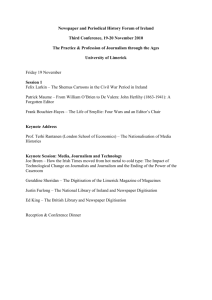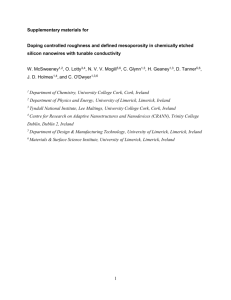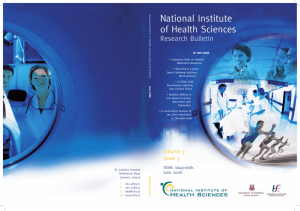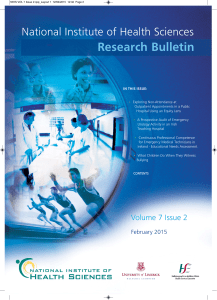Proceedings of Paris Economics, Finance and Business Conference
advertisement
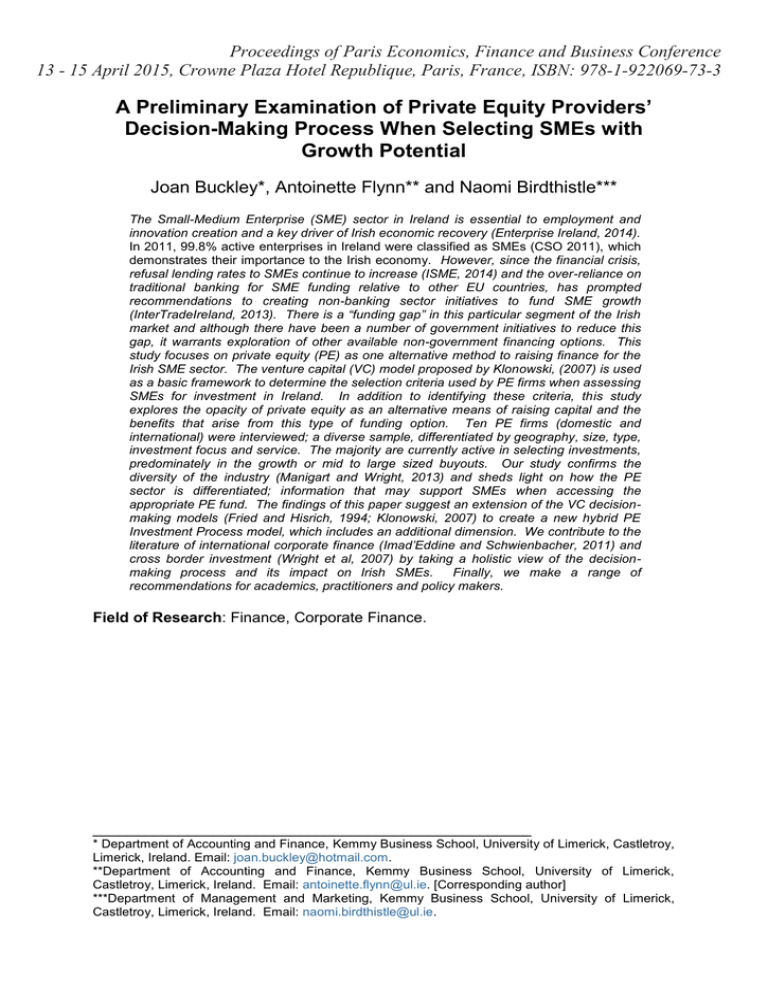
Proceedings of Paris Economics, Finance and Business Conference 13 - 15 April 2015, Crowne Plaza Hotel Republique, Paris, France, ISBN: 978-1-922069-73-3 A Preliminary Examination of Private Equity Providers’ Decision-Making Process When Selecting SMEs with Growth Potential Joan Buckley*, Antoinette Flynn** and Naomi Birdthistle*** The Small-Medium Enterprise (SME) sector in Ireland is essential to employment and innovation creation and a key driver of Irish economic recovery (Enterprise Ireland, 2014). In 2011, 99.8% active enterprises in Ireland were classified as SMEs (CSO 2011), which demonstrates their importance to the Irish economy. However, since the financial crisis, refusal lending rates to SMEs continue to increase (ISME, 2014) and the over-reliance on traditional banking for SME funding relative to other EU countries, has prompted recommendations to creating non-banking sector initiatives to fund SME growth (InterTradeIreland, 2013). There is a “funding gap” in this particular segment of the Irish market and although there have been a number of government initiatives to reduce this gap, it warrants exploration of other available non-government financing options. This study focuses on private equity (PE) as one alternative method to raising finance for the Irish SME sector. The venture capital (VC) model proposed by Klonowski, (2007) is used as a basic framework to determine the selection criteria used by PE firms when assessing SMEs for investment in Ireland. In addition to identifying these criteria, this study explores the opacity of private equity as an alternative means of raising capital and the benefits that arise from this type of funding option. Ten PE firms (domestic and international) were interviewed; a diverse sample, differentiated by geography, size, type, investment focus and service. The majority are currently active in selecting investments, predominately in the growth or mid to large sized buyouts. Our study confirms the diversity of the industry (Manigart and Wright, 2013) and sheds light on how the PE sector is differentiated; information that may support SMEs when accessing the appropriate PE fund. The findings of this paper suggest an extension of the VC decisionmaking models (Fried and Hisrich, 1994; Klonowski, 2007) to create a new hybrid PE Investment Process model, which includes an additional dimension. We contribute to the literature of international corporate finance (Imad’Eddine and Schwienbacher, 2011) and cross border investment (Wright et al, 2007) by taking a holistic view of the decisionmaking process and its impact on Irish SMEs. Finally, we make a range of recommendations for academics, practitioners and policy makers. Field of Research: Finance, Corporate Finance. ___________________________________________________ * Department of Accounting and Finance, Kemmy Business School, University of Limerick, Castletroy, Limerick, Ireland. Email: joan.buckley@hotmail.com. **Department of Accounting and Finance, Kemmy Business School, University of Limerick, Castletroy, Limerick, Ireland. Email: antoinette.flynn@ul.ie. [Corresponding author] ***Department of Management and Marketing, Kemmy Business School, University of Limerick, Castletroy, Limerick, Ireland. Email: naomi.birdthistle@ul.ie.
